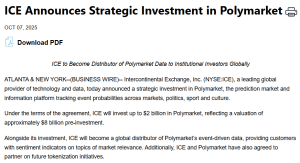Deutsche Bank Sees Bitcoin as Central Bank Reserve by 2030: Report

- Deutsche Bank predicts Bitcoin could join gold as a central bank reserve by 2030.
- Analysts say Bitcoin’s reduced volatility makes it a strong inflation hedge.
- Corporate adoption and regulation boost Bitcoin’s path to institutional trust.
Deutsche bank forecasts that by 2030, Bitcoin will be used by central banks as an additional reserve asset besides gold. The report points out Bitcoin as increasingly legitimate with reduced volatility and its possibility as an inflation and geopolitical risk hedge. According to analysts, the emergence of the cryptocurrency is an indication that the world institutions are beginning to perceive digital activities as long-term repositories of value.
The price of Bitcoin has just surged to a new all-time high over $125,000. The boom combined with the weakening volatility has also made it more attractive to institutionalized investors. Analysts Camilla Siazon and Marion Laboure of Deutsche Bank stated that BTC is now acting in the same way as gold, which has long been regarded as a stable and scarce asset.
Also Read: Bitcoin (BTC) Shatters Records at $125,750 — Is $200K Next?
Bitcoin’s Scarcity Fuels Global Reserve Potential
In their opinion, BTC may turn into a source of financial stability early next century. The analysts estimate that in 2030, BTC might have been added to the central banks books of reserve. According to them, the scarcity of BTC plus the ever-growing demand all over the world makes the cryptocurrency a viable diversification instrument, the nation wanting to remain stable.
Gold maintains its position as a safe haven. Inflation and political uncertainty have led central banks to purchase gold in order to hedge against uncertainty, particularly in the United States. Bitcoin is however a modern option since it is not associated with a government and currency. It is decentralized which makes it attractive worldwide.
BTC has a fixed amount of 21 million coins, which has made it unresponsive to inflation. With the increase in demand the scarcity goes up, which in turn pushes the value up. Similarly to gold, the attractiveness of Bitcoin is that it is not affected by politics and monetary policy.
The credibility of BTC has also been enhanced by the corporate interest. BTC is being kept in the treasury of many companies as an asset against currency devaluation. This is an increase in the number of institutions marking a new stage of maturity of cryptocurrency. It is liquid and is therefore investor confidential making it fit well to do on a large scale.
BTC’s Stability and Regulation Drive Path to Institutional Adoption
The volatility of Bitcoin has also decreased considerably during the past years due to the Deutsche Bank. Lower ranges of movement create price stability when holding long-term. According to analysts, this stability makes BTC more suitable as a reserve asset and virtually makes it a better digital gold.
Still, challenges remain. BTC lacks physical assets or cash flow support as to conventional reserves. It is valuable according to the perception of the market and investor confidence. Critics believe that this has to inhibit its role in long-term holding in official portfolios. Nevertheless, the fact that Bitcoin is not dependent on governments is a strong aspect.
Another determinant of the acceptability of BTC is regulatory clarity. There are enhanced governments and financial settings providing policies in digital assets. According to Deutsche bank, with changes in regulations, central bank adoption is probably going to improve.
This view is supported by Hex Trust CEO Alessio Quaglini. He mentioned that American banks are about to receive Bitcoin custody and trade as soon as regulations clear. Quaglini referred to U.S. policy as the global template with regard to crypto adoption. His company, Hex Trust, focuses on digital asset and trading of its offerings in institutions in Asia, Europe, and the Middle East.
He also regards the issue of stablecoins as a significant disruptor, as he forecasts that the technology will substitute platforms such as the SWIFT used when making a payment across countries. Quaglini explained that Hex Trust could withstand market fluctuations because of its retail speculation orientation, unlike institutional clients.
Also Read: Bitcoin Vs S&P 500: How the Crypto Outperformed Traditional Stocks Since 2020
You May Also Like

Bitcoin Breaks Below $100K But Stablecoin Inflows Hint at Quiet Re-Risking

Polymarket To Provide UFC, Zuffa Boxing With Real-Time Fan Predictions
